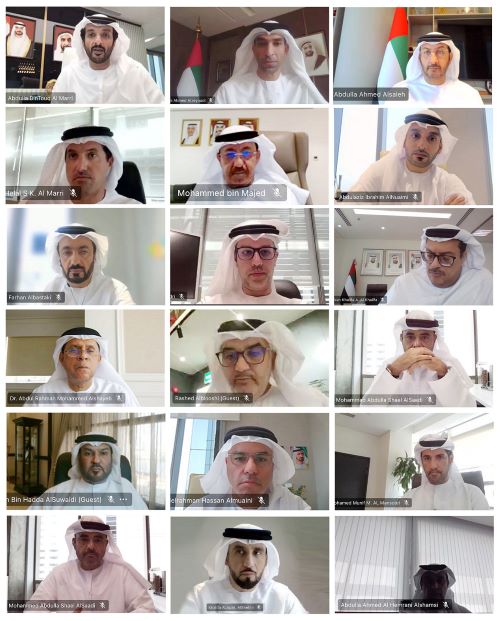Economic Integration Committee discusses an array of initiatives aimed at solidifying UAE’s position

The Economic Integration Committee held its fourth meeting for the year 2023, chaired by H.E. Abdulla Bin Touq Al Marri, Minister of Economy. H.E. Dr. Thani bin Ahmed Al Zeyoudi, Minister of State for Foreign Trade, and the representatives of the UAE’s local economic development departments also attended the meeting.
H.E. Bin Touq emphasized that the UAE has made a tremendous breakthrough in its progress in building a new economic model based on knowledge, innovation and creativity; diversifying the national economy; and enhancing its flexibility and global competitiveness in line with the wise leadership’s vision.
The Minister of Economy said: “Today, the UAE is seen as a pioneer in empowering the new economy sectors, most notably renewable energy, advanced financial technology, artificial intelligence, the fourth industrial revolution, entrepreneurship and space. Emirati astronaut Sultan Al Neyadi’s successful space mission – the longest in Arab history – is one of the most recent achievements the country has accomplished in this regard.”
He added: “The UAE government marks the space sector as one of the key pillars of its knowledge economy. Over the past years, it has developed pioneering legislation and flexible laws, keeping pace with the country’s future aspirations in this sector.”
H.E. Bin Touq explained that the Economic Integration Committee will continue to work to support the country’s ambitious goal of becoming a global hub for new economy in line with the ‘We the UAE 2031’ vision. This will be achieved through the development of economic legislation and the adoption of innovative initiatives that enable the new economic sectors to enhance their contributions to the national GDP and the creation of employment opportunities in general, and jobs in the future sectors in particular.
In detail, the latest Committee meeting discussed a number of key topics, which will contribute to enhancing the business-friendliness of the UAE’s economic environment and its attractiveness as an FDI destination, in all strategic sectors. These include a proposal by the Department of Economic Development-Abu Dhabi to link the data of all kinds of licenses issued by local registration authorities in the country and free zones with NER in two main phases. This aims to provide proactive services to investors and customers through better integration of services, thereby increasing customer satisfaction, as well as improving the effectiveness of operations and automation and accelerating the time needed to process them.
The meeting further discussed key developments with regard to amendments to Cabinet resolutions 58 and 53 on the organization of real beneficiary procedures. These include the introduction of administrative sanctions in accordance with the action plan; the review of the project ‘checklist’ policy on business; and the ‘blacklist’ prepared by the Ministry of Economy in cooperation with the country’s corporate registrars, with the aim of establishing a national policy for verifying natural and legal persons when establishing businesses. This will help enhance the resilience of the country’s AML/CFT system.
Finally, the meeting reviewed the results of an EMIR survey conducted in collaboration with the Ministry of Economy on the availability of talent in the country, which included 216 regional executives in the UAE from 13 diverse sectors.
Last Updated on 1 year by News Desk 1













